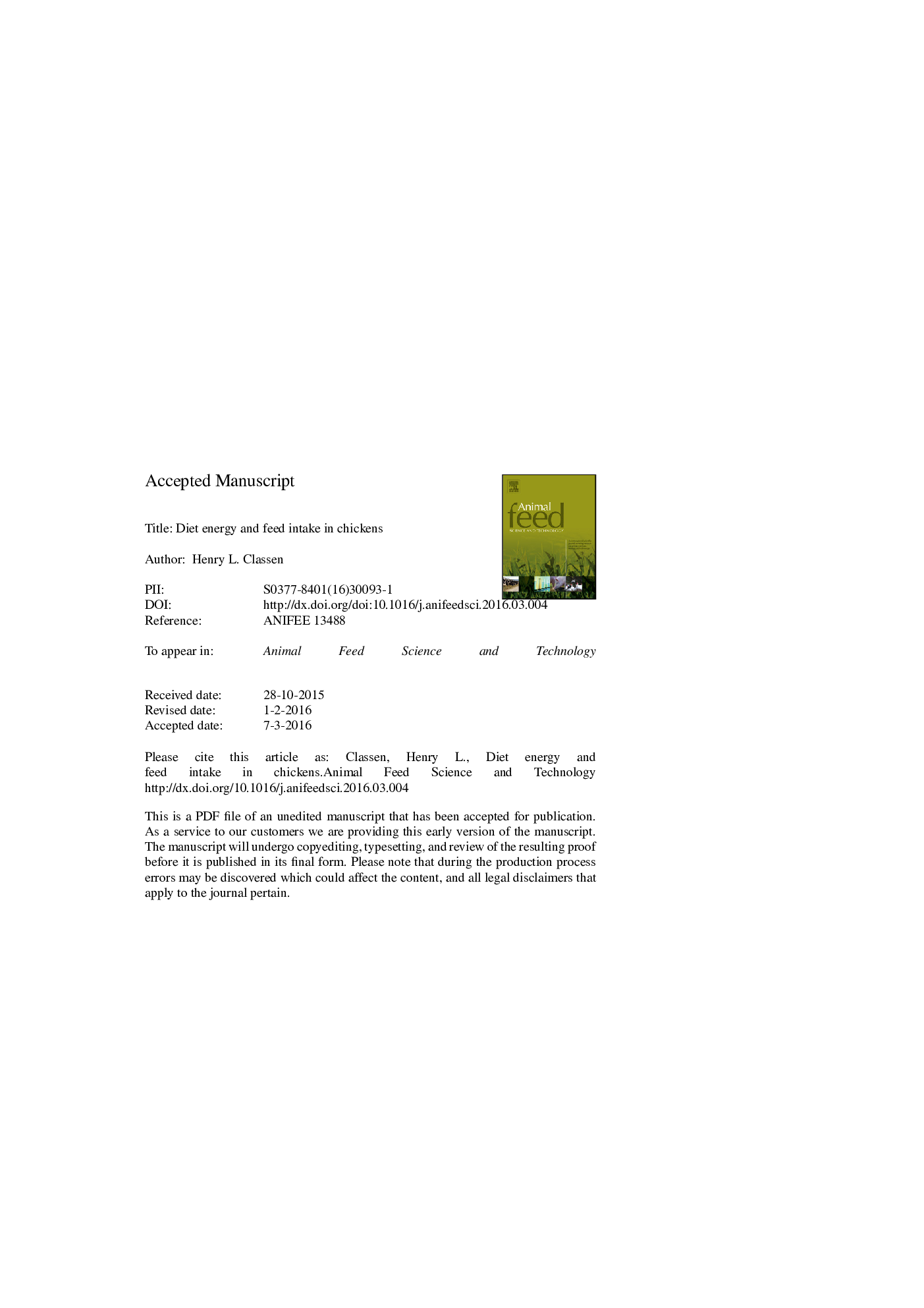| کد مقاله | کد نشریه | سال انتشار | مقاله انگلیسی | نسخه تمام متن |
|---|---|---|---|---|
| 8491096 | 1552353 | 2017 | 29 صفحه PDF | دانلود رایگان |
عنوان انگلیسی مقاله ISI
Diet energy and feed intake in chickens
ترجمه فارسی عنوان
رژیم غذایی و مصرف خوراک در جوجه ها
دانلود مقاله + سفارش ترجمه
دانلود مقاله ISI انگلیسی
رایگان برای ایرانیان
کلمات کلیدی
CCKGLP-1GLP-2PYYAMEnBroilers - جوجههای گوشتیGastrointestinal tract - دستگاه گوارشFeed form - فرم خوراکLaying hens - مرغ تخمگذارEnergy homeostasis - هومئوستاز انرژیglucagon-like peptide-1 - پپتید 1-گلوکاگون-مانندGlucagon-like peptide-2 - پپتید 2 مانند گلوکاگونpeptide YY - پپتید YYGenotype - ژنوتیپcholecystokinin - کولهسیستوکینینGut - گل سرخ
ترجمه چکیده
هوموستاز انرژی اهمیت اساسی در سلامت حیوانات و همچنین تغذیه گونه هایی مانند جوجه ها دارد. بهینه سازی تعادل بین مصرف انرژی و هزینه های مورد نیاز برای گله های کارآمد و بسیار مولد، و درک ارتباط آن با ویژگی های تولید از جمله انرژی و مصرف خوراک برای تشکیل جیره های مرغ و سطوح دیگر مواد غذایی رژیمی ضروری است. یک دیدگاه تاریخی در رابطه با این رابطه این است که جوجه ها مصرف خوراک را برای حفظ مصرف انرژی در زمانی که رژیم غذایی حاوی انرژی متغیر غذایی است، تغییر می دهد. به نوبه خود سطوح مواد مغذی دیگر و به ویژه اسیدهای آمینه باید مطابق با آنها تنظیم شود. با این حال، کنترل مصرف خوراک پیچیده است و حتی اگر این دیدگاه درست باشد، عوامل متعددی می توانند تنظیم مناسب در مصرف خوراک را به خطر بیندازند. اعتبار جوجه های گوشتی که تغذیه مصرف خوراک را در پاسخ به انرژی رژیم تغذیه کرده اند، برای مدت زمان طولانی مورد سوال قرار گرفته است و شواهد اخیر نشان می دهد که جوجه های مدرن مرغ های تخمگذار همچنین نمی توانند به طور دقیق یا قابل اعتماد در مصرف انرژی مصرفی را در پاسخ به سطوح انرژی غذایی تغییر دهند. بر اساس این فرض که جوجه ها به انرژی مناسب در رژیم پاسخ ندهند، رژیم های غذایی باید برای تضمین انرژی مناسب کافی برای رعایت الزامات پرنده برای نگهداری و تولید، و به این ترتیب پتانسیل افزایش پروتئین در رژیم غذایی را به حداکثر برسانند.
موضوعات مرتبط
علوم زیستی و بیوفناوری
علوم کشاورزی و بیولوژیک
علوم دامی و جانورشناسی
چکیده انگلیسی
Energy homeostasis is of fundamental importance to animal well-being as well as in the feeding of species like chickens. Optimizing the balance between energy intake and expenditures is required for efficient, highly productive flocks, and understanding its relationship to production characteristics including energy and feed intake is fundamental to the formulation of chicken diets and levels of other dietary nutrients. A historical perspective on this relationship is that chickens alter feed intake to maintain energy intake when diets contain variable dietary energy. In turn levels of other nutrients, and in particular amino acids, should be adjusted in accordance. However, control of feed intake is complex and even if this perspective were correct, multiple factors can compromise the appropriate adjustment in feed intake. The validity of broilers altering feed intake in response to dietary energy has been questioned for some time and more recent evidence suggests that modern strains of laying hens also are unable to accurately or reliably alter feed intake in response to dietary energy levels. Based on the premise that chickens do not appropriately respond to dietary energy, diets must therefore be formulated to ensure adequate dietary energy to meet the bird's requirements for maintenance and production, and thereby maximize the protein accretion potential of the diet.
ناشر
Database: Elsevier - ScienceDirect (ساینس دایرکت)
Journal: Animal Feed Science and Technology - Volume 233, November 2017, Pages 13-21
Journal: Animal Feed Science and Technology - Volume 233, November 2017, Pages 13-21
نویسندگان
Henry L. Classen,
